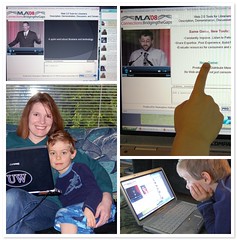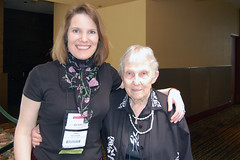
Just as we've collectively settled down from the fun & excitement of our Medical Library Association (MLA) 2008 conference in Chicago, Michelle Goodwin gave us a taste of what's in store for us in the Pacific Northwest Chapter of the Medical Library Association (PNC/MLA):
The Pacific Northwest chapter of the Medical Library Association is planning an exciting continuing education event October 3 & 4 at the beautifully appointed Watertown Hotel (not far from the University of Washington) in Seattle. With the unseasonably cool weather, many of you may be wondering if the cool, crisp days of autumn are already upon us. Fortunately, we still have a few months before September is here, so you have plenty of time to sign up for the PNC '08 Education Update.
Forty rooms have been set aside for members at a reduced rate of $145/night. The Friday evening Welcome Reception will be held at the Portage Bay Cafe. We are excited to offer several valuable, interesting courses for our education update, including:
* "Electronic Health Records & the Health Sciences Librarian: A Forum"
- Thomas Payne, Sara Pimental, Kaye Martin, Emily Hull & Judith Hayes ($35)
* "Data Collection for Health Information Outreach" - Susan Barnes ($50 members/$80 non-members)
* "Hands-On Web 2.0: Collaboration, Embeddable Web, Online Software, and
New Ways of Sharing Information" - Greg Notess ($50 members/$80 non-members)
* "Value-added Searching" - Mary Ellen Bates ($50 members/$80 non-members)
The Hands-on Web 2.0 class will be held in the UW Health Sciences Library computer classroom; all other classes will be held at the Watertown Hotel.
With captivating topics and nationally-renowned speakers, this is an event not to be missed! Additional details will be forthcoming on the PNC/MLA website.
Regards,
PNC/MLA Professional Development Committee
Personally, I'm quite excited about the electronic health record (EHR) forum as I hold Dr. Tom Payne in high regard. The integration of EHRs with current, quality medical information for both clinicians and patients is a strong interest of mine, and I'm delighted he's agreed to join us for what should be an interesting discussion of how we as medical librarians can be part of this essential part of healthcare information systems.
I must confess to being completely Web 2.0ed out (is 2.0ed a word?) although I've enjoyed articles from Greg Notess (of Search Engine Showdown fame) when I was in school and his presentation at our regional conference last year in Billings, MT so I may have to give that a go as well.


